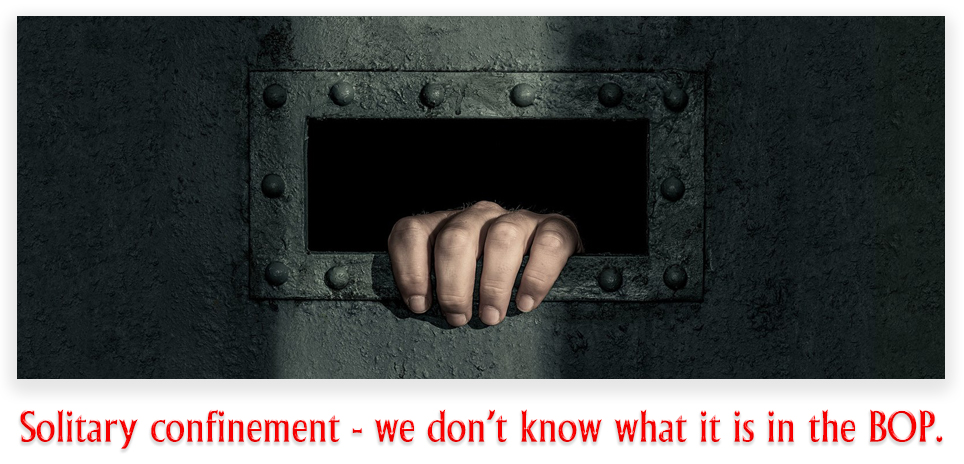We post news and comment on federal criminal justice issues, focused primarily on trial and post-conviction matters, legislative initiatives, and sentencing issues.

WAR IS PEACE
 Remember George Orwell’s dystopian novel, Nineteen Eighty Four? The protagonist, Winston Smith worked for the Ministry of Truth, one task of which was to destroy words. The government championed the slogan, War is Peace, Freedom is Slavery, Ignorance is Strength.
Remember George Orwell’s dystopian novel, Nineteen Eighty Four? The protagonist, Winston Smith worked for the Ministry of Truth, one task of which was to destroy words. The government championed the slogan, War is Peace, Freedom is Slavery, Ignorance is Strength.
Now try this one on for size, from a Dept. of Justice Inspector General’s report on the Federal Bureau of Prisons (BOP) use of restrictive housing for mentally-ill inmates:
Although the BOP states that it does not practice solitary confinement, or even recognize the term, we found inmates, including those with mental illness, who were housed in single-cell confinement for long periods of time, isolated from other inmates and with limited human contact. For example, at the ADX, we observed an RHU that held two inmates, each in their own cell, isolated from other inmates. The inmates did not engage in recreation with each other or with other inmates and were confined to their cells for over 22 hours a day. Also, in five SHUs, we observed single-celled inmates, many with serious mental illness. One inmate, who we were told was denied ADX placement for mental health reasons, had been single-celled for about 4 years.
So there’s no solitary confinement, because we say so. Unsurprisingly, because the BOP denies solitary confinement exists, it does not properly track and limit the length of time prisoners spend in restrictive housing. At the same time, the DOJ report found, the BOP’s inadequate documentation of inmates’ mental illness results in inappropriate mental health treatment or no treatment at all.
The report highlighted issues with a number of BOP facilities for their mistreatment of mentally ill inmates, but singled out the U.S. Penitentiary in Lewisburg, Pennsylvania, for particular opprobrium. Lewisburg is the subject of a class action lawsuit brought several months ago over treatment of mentally ill prisoners.
 The report said the BOP’s poor documentation of mental health diagnoses leaves many cases of mental illness underreported. According to an OIG study done in 2011 and 2012, 14% of state and federal prisoners reported experiencing serious psychological distress; 37% have been told by a mental health professional they had a mental disorder. A 2006 Bureau of Justice Statistics report found about 45% percent of federal inmates showed symptoms or a recent history of mental illness. Despite that, the Inspector General reports, only 3% of BOP inmates were being treated regularly for mental illness. One BOP facility’s deputy chief psychologist estimated half of the inmates there had Antisocial Personality Disorder. The official BOP numbers say only 3.3% of the inmate population was documented for this order.
The report said the BOP’s poor documentation of mental health diagnoses leaves many cases of mental illness underreported. According to an OIG study done in 2011 and 2012, 14% of state and federal prisoners reported experiencing serious psychological distress; 37% have been told by a mental health professional they had a mental disorder. A 2006 Bureau of Justice Statistics report found about 45% percent of federal inmates showed symptoms or a recent history of mental illness. Despite that, the Inspector General reports, only 3% of BOP inmates were being treated regularly for mental illness. One BOP facility’s deputy chief psychologist estimated half of the inmates there had Antisocial Personality Disorder. The official BOP numbers say only 3.3% of the inmate population was documented for this order.
Obviously, if the BOP doesn’t know who has a problem, it cannot very well treat it.
BOP does not limit how long an inmate can be held in restrictive housing, defined as SHUs (Special Housing Units, located at 119 BOP facilities), the one SMU still operating at USP Lewisburg, and of course, the ADX in Florence. In May 2014, the BOP adopted a new mental health policy to improve the treatment of inmates with mental illness, including those being held in RHUs. The BOP promptly experienced a 30% reduction in the number of inmates receiving regular mental health treatment. The policy, intended to increase the number of inmates diagnosed as needing mental health treatment, failed due to lack of staffing and resources, according to the report.
BOP says it has taken steps to improve conditions for mentally ill inmates, such as diverting inmates with serious mental illness from traditional RHUs to residential mental health treatment programs. However, the report found many issues remain with the BOP system, including dire staffing shortages and lack of metrics to determine program effectiveness.
 The lead plaintiff in McCreary v. Federal Bureau of Prisons is a Lewisburg inmate who has been diagnosed with bipolar disorder, schizophrenia, depression, mood disorder, psycho-social, and environmental problems, ADHD, and antisocial personality disorder. He attempted suicide on multiple occasions and is now being held in a single cell at Lewisburg. The lawsuit alleged he has not left his cell since May 16 and has to shout through his cell door for his weekly, two-minute mental health “therapy” sessions.
The lead plaintiff in McCreary v. Federal Bureau of Prisons is a Lewisburg inmate who has been diagnosed with bipolar disorder, schizophrenia, depression, mood disorder, psycho-social, and environmental problems, ADHD, and antisocial personality disorder. He attempted suicide on multiple occasions and is now being held in a single cell at Lewisburg. The lawsuit alleged he has not left his cell since May 16 and has to shout through his cell door for his weekly, two-minute mental health “therapy” sessions.
Lucky for him there’s no solitary confinement in the BOP.
International Business Times, Federal Prisoners Lack Proper Mental Illness Treatment Amid Lack of Prison Staff, Investigators Say (July 13, 2017)
Lawstreet.com, DOJ Report Criticizes Prisons’ Treatment of Mentally Ill Inmates (July 18, 2017)
Dept. of Justice Office of Inspector General, Review of the Federal Bureau of Prisons’ Use of Restrictive Housing for Inmates with Mental Illness (July 12, 2017)
– Thomas L. Root

 A Government Accountability Office report to Congress issued last week found that about two-thirds of BOP inmates with a serious mental were locked up for drug crimes (23%), sex offenses (18%), weapons charges (17%), or robbery (8%). Seriously mentally ill people are about twice as likely to be incarcerated for sex offenses, robbery, or homicide/aggravated assault as people without serious mental illness, and were incarcerated for drug and immigration offenses at about half or less the rate of inmates without serious mental illness.
A Government Accountability Office report to Congress issued last week found that about two-thirds of BOP inmates with a serious mental were locked up for drug crimes (23%), sex offenses (18%), weapons charges (17%), or robbery (8%). Seriously mentally ill people are about twice as likely to be incarcerated for sex offenses, robbery, or homicide/aggravated assault as people without serious mental illness, and were incarcerated for drug and immigration offenses at about half or less the rate of inmates without serious mental illness.



